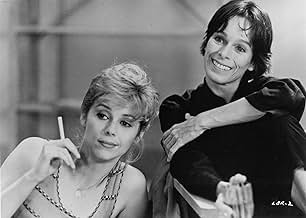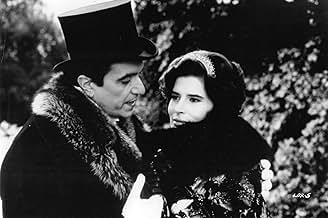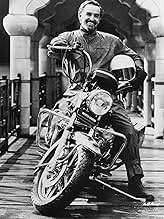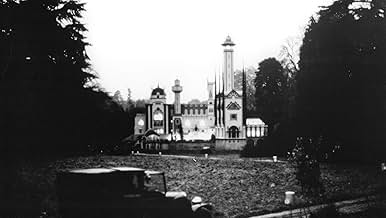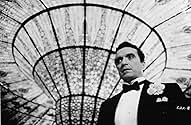La vie est un roman
- 1983
- Tous publics
- 1h 50m
Three intertwined tales. On the eve of the First World War, Count Forbek starts to build a fantastic castle in the Ardennes forest. After the war he uses it to start a utopian society by bra... Read allThree intertwined tales. On the eve of the First World War, Count Forbek starts to build a fantastic castle in the Ardennes forest. After the war he uses it to start a utopian society by brainwashing his friends, including his former fiancee, Livia, and her husband. In the presen... Read allThree intertwined tales. On the eve of the First World War, Count Forbek starts to build a fantastic castle in the Ardennes forest. After the war he uses it to start a utopian society by brainwashing his friends, including his former fiancee, Livia, and her husband. In the present day, the castle is being used as an alternative school and, in the summer holidays, for ... Read all
- Awards
- 3 nominations total
- Director
- Writer
- All cast & crew
- Production, box office & more at IMDbPro
Featured reviews
The two utopian experiments are contrasted with a medieval story that seems to comment on the other two stories....In fact, the medieval story is an idealistic view of the world as the children see it. So there are, in fact, three ideals contrasted. This makes for a very complicated structure which you may ignore if you just want to watch the interactions of the characters or listen to the delightful music.
Would have been a 4/10 for being maybe tolerable, but with the addition of that arbitrary, inexplicable singing- worst of all, other characters pretending as if no such thing had occurred- a 3/20 is generous.
Alas, my fault. Always trying to give highly commended artists the greatest benefit of the doubt. I want to be proven wrong, that I overlooked something. Did I? Not this time. He should probably stick to Nazi documentaries.
Fair point. But here's something else.
Resnais broadly speaking loves two things. On one hand theater, movies, architecture, comic-books (he is an avid collector) - so by extension, the color, frill and artifice of appearance. And you can see that in his actual films, almost without exception tuned to musing, fabrication and some form of theatricality.
His primary interest, however, is extending this notion of constructed realities to the deep end of the architecture of self. In simple terms, he attempts to show that what we largely accept as abstract propositions about ourselves (thought, memory) are internally the same fabrication as anything we build in life, governed by exactly the same mechanism.
Cinema is the best medium to inherit the endeavor - not only is every image (as is every thought) staged in the mind's eye, not only does the camera as internal narrator shuffle and slide through successive planes of narrative, but external space (the library in Tout le Histoire, the museum in Hiroshima, the hotel in Marienbad, the capsule in Je t'aime, etc.) mirrors our experience of internal space, the faculties of consciousness.
Add to these the lavish château somewhere in the Ardennes of this film.
There are three overlapping narratives centered on that place. One is romantic myth about the baby son of a king who grows up to slay the dragon and rescue the maiden. The second is about an architect in the 1910's whose plans to build the château and marry his loved one are interrupted by WWI. The third is set in present times, about a conference of intellectuals who convene there to discuss new educational (narrative) principles.
The main narrative thrust across all three is that there is no harmony in the workings of the soul, though we construct artifice to that effect. There is a dialogue of sorts this kicks off within the film. Look at what Resnais does.
All three narratives centered on artifice and ritual. Myth, glassy theatric decor, operatic singing in the first. Miniature model, actual building and ritualized experiment that later takes place there in the second. Another miniature landscape, the conference and romantic plot (which is not spontaneous but manipulated by a third party, artificial) in the third.
And the point repeated across all three is what? But of course the forcible attempt to create harmony, which is to say forcing nature to conform to what the mind thinks it ought to be.
Of the three, only the myth is happily resolved, the obvious product of fabrication.
The architect conducts an experiment that supposedly is going to make everyone happy and in harmony with the world, but all the guests drink the miraculous potion except the love of his life; love cannot be manipulated to happen.
The conference erupts in violent disagreement over the preferred educational method. The romantic thrysts end in unpredictable notes, not at all according to the plan of the woman who has manipulated the plot - played by Geraldine Chaplin, whose father made his cinematic fortunes by peddling artificial harmony and miraculous love.
The point is that there is no harmony outside the stories we devise to attempt it, no single method to navigate the landscape of life. Being interested, alert, spontaneous and involved in its exploration, like the teacher is interested in the miniature landscape laid before the educators, is the only way.
This is good stuff, folks, showing wisdom. It will not immediately win you over, because it's not a rich swim like early Resnais or Tarkovsky. It is whimsical, but not in the confrontational way of Greenaway, a bit chaste. The eye does not move walls of perception around, as in Welles. Unlike Inception, it explains in light ripples.
So be it. I count it next to Draughtsman as among the most intelligent in film.
Did you know
- TriviaWhile old fashioned Kodak film was used for the 1910s scenes and legendary period, modern Fuji film was shot for the 1982 storyline, opposing dreamlike effects of the former to realism of the latter.
- ConnectionsFeatured in Legendy mirovogo kino: Fanny Ardant
- How long is Life Is a Bed of Roses?Powered by Alexa
Details
- Release date
- Country of origin
- Languages
- Also known as
- Life Is a Bed of Roses
- Production companies
- See more company credits at IMDbPro
- Runtime1 hour 50 minutes
- Sound mix
- Aspect ratio
- 1.66 : 1
Contribute to this page


